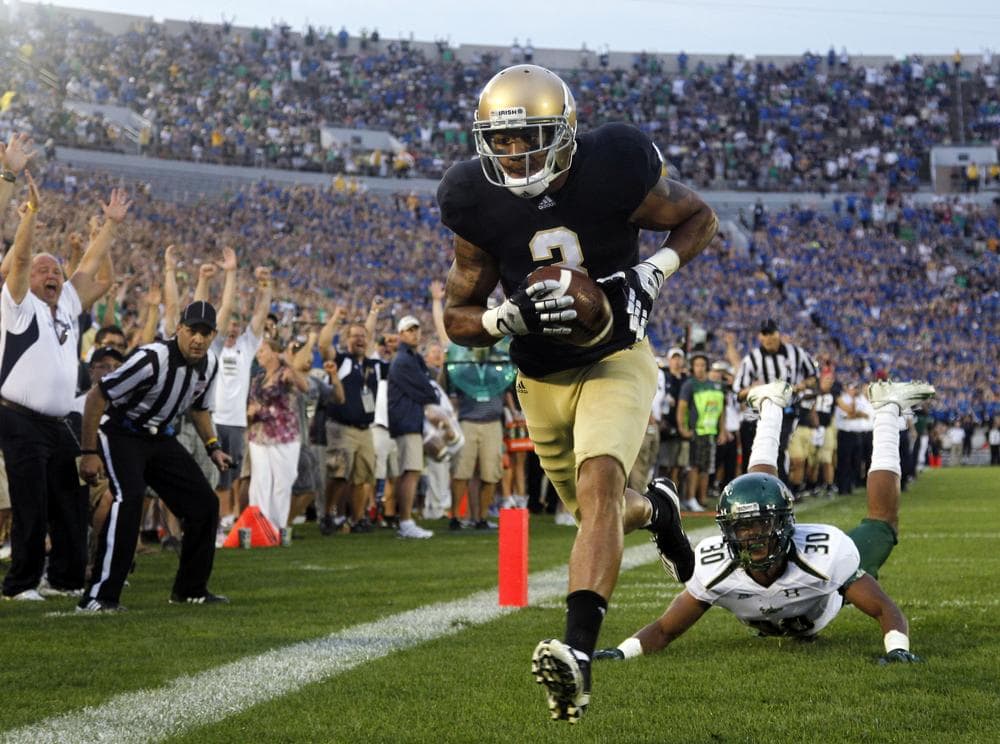Advertisement
Study: Off-Field Issues Create NFL Draft Bargains
Resume
"I know this: on any level, if you don't have a quarterback, it's really, really hard to win," said new Indianapolis Colts head coach Chuck Pagano.
Absolutely. Because if you don't have a quarterback, when the center hikes the ball, it just keeps going.
But Pagano was speaking about a particular quarterback, the man the Colts drafted Thursday with the first pick they'd earned by being 2-14 last season. Even before the draft, Coach Pagano was excited about Andrew Luck's future.
[sidebar title="More Trouble in New Orleans" width="270" align="right"]Bill Littlefield looks at allegations that Saints General Manager Mickey Loomis monitored opposing coaches conversations.[/sidebar]
"The intangibles are off the chart. You know, the skill set, you're seen his body of work. You know, he's a gym rat, he's a football junkie, and he's big, he's strong, he's physical, he can make every throw out there, and he's a great leader in his own way," he said.
The transition from college football to the pros is rarely easy, and Andrew Luck's promotion is complicated by the extraordinary record of the man the Colts let go in order to rebuild their team around Luck. It's a challenge the new Colts quarterback acknowledged.
"How do you really replace Peyton Manning? You know, he's a legend. Already one of the best ever, my football hero growing up. But, you know, I have fairly high expectations for myself," Luck said.
Other notable picks in Thursday's wild first round, which involved more trades than in recent years, included Washington's selection of Baylor quarterback Robert Griffin III at No. 2, Cleveland's trade up to No. 3, where they chose Alabama running back Trent Richardson, and Seattle's surprising selection of Bruce Irvin at No. 15, despite earlier projections the West Virginia linebacker would go near the bottom of the second round because of off-field issues.
Do NFL teams hurt themselves in the draft by downgrading prospects who've been in trouble with the law?
A new study out of Hamilton College suggests that they do. Hamilton Associate Professor of Economics Stephen Wu joined us this week to discuss his study.
The study posits that NFL teams under-value players with off-field character issues, and that compared to other players drafted with the picks immediately before and after them, players with such character issues tend to perform better.
"What we found was, conditional on where they were picked in the draft, [players] that were arrested, but not charged with a crime, were predicted to start more games and play more games," Wu said. "So, in that sense, given where they were selected, they were somewhat under-valued, or they were over-penalized for their character concerns."
However, this phenomenon does not apply to players who had discipline issues on the field, such as conflicts with coaches or fellow players.
"When you look at players that did have some trouble with coaches, or were suspended for team rules, or perhaps it was a conflict with a teammate, those players did not perform as well as their counterparts. In other words, the downgrading of players that have issues with coaches or teammates was more warranted."
"Different types of character issues may affect on-field performance differently," Wu continued. "Specifically, it seems that the folks who have issues on the field with coaches, other players, they are ones that are more affected on the field in terms of performance, whereas the ones who have run-ins with the law or other types of issues, while that may be bad for a whole other set of reasons, at least in terms of on-field performance, they're doing better than the expectation."
This segment aired on April 28, 2012.